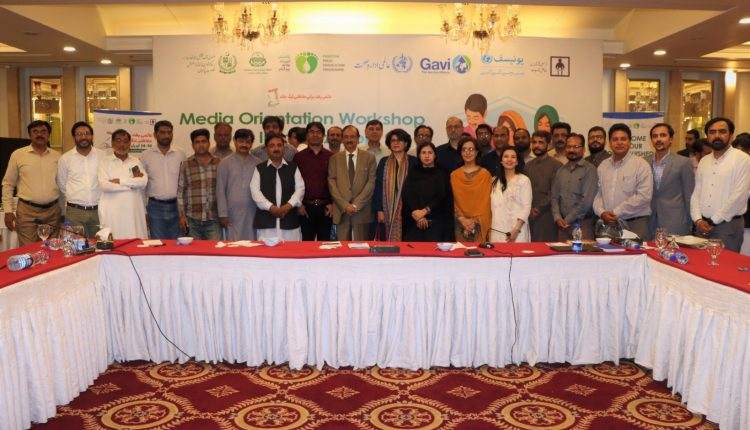Rawalpindi: Provincial Minister for Primary and Secondary Health Dr Jamal Nas8ir has said that the government of Punjab is committed to provide better healthcare facilities to all the people of the province without any discrimination.
He was speaking at a one-day media orientation workshop on the Expanded Programme of Immunization (EPI) here on Monday. Media workshop was organized by Expanded Program on Immunization (EPI) in collaboration with UNICEF.
He said that though the government has lack of funds but with the help of donors’ agencies and partners, such as World Health Organization, (WHO) UNICEF and GAVI the EPI project is carried on in the Punjab to protect the minor kids from 12 different diseases.
The minister said that the caretaker government in Punjab, in its short tenure of almost four months has provided the best healthcare facilities including laboratory tests and checkup to some 48000 prisoners detained in 43 jails of the province. Similarly, it had also given health amenities to some 17000 police officials.
He said that the interim government has also promoted the health officials including doctors, nurses, paramedic staff, Lady Health Visitors (LHVs) , Lady Health Supervisors (LHSs) in the higher pay grades. These all promotions made in the Health Department were totally on merit and without any recommendations.
“Provincial health department has created 1045 adhoc jobs including 450 Consultants and 600 Medical Officers. All the people recruited on these jobs will be on purely merits. The incumbent Punjab government has provided 200 ambulances to the Basic Health Units (BHUs) and 300 Ultra Sound Machines to the hospitals located at remote villages of the province.
A service with the name of “Buraq” has been started by the health department Punjab in which a qualified team of engineers would look after the maintenance and repair of the machinery and equipment installed in government hospitals at different stations of Punjab.
“The provincial government would have zero tolerance regarding the provision of medicine to the patient in the public sector hospitals. If it is proved that any medicine was available in the store of the hospital, and if the doctor asks the patient to buy the same medicine from the market, then it would be dealt with stern action”, Jamal added.
Earlier Director EPI Punjab Dr. Mukhtar Ahmed Awan said in his briefing said that at present minor children are being given the dose against 12 diseases in which 10 are injectable and only two are oral in the shape of drops.
He said that the vaccines and drops that are given to the children are recommended by WHO and it costs 400 USD per child but the government is providing free of cost to minors with the help of UNICEF and WHO.
“Every child is provided EPI dose seven times from birth to the age of 18 months to complete the course. The first dose is given just after birth. The second time the medicine is given at the age six weeks, then at the age 10 weeks at the third time. After that when the child becomes 9 months the fourth and at 14 months the fifth bout is administered. Then at the age 14 months and then the minor gets the last dosage when he has a lifespan of 18 months”, Dr Awan added.
He apprised the gathering that some 3.39 million children are born every year only in Punjab province but due to good management of the Punjab government some 92 percent of the children have been covered up by EPI, which is the highest in the country. The increase in coverage was recorded 32 percent from 2011 to 2022 in Punjab.
Dr Tahir Manzoor and Dr Qurat-ul-Ain from UNICEF and Dr. Asif Shahzad from WHO also spoke on the occasion. They said that the target of 100 percent coverage in the expanded immunization programme should be achieved by teamwork.
They urged the media to play its role in creating awareness and removing the public apprehensions reading the programme.

